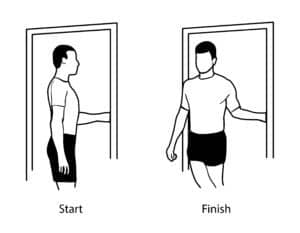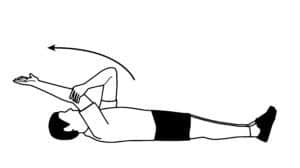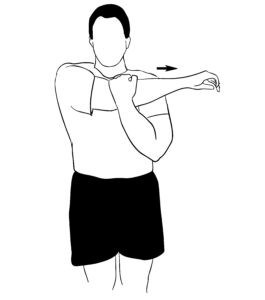
We often come across this very common phrase of “giving the cold shoulder”. The phrase implies someone deliberately ignoring the other by not moving in their direction or by snubbing them by showing their back. The origin of the phrase lies in a medical condition called adhesive capsulitis, popularly called the frozen shoulder.
This is a very common condition and cases of frozen shoulders spike up, especially around winter. This is also a very common sports injury, especially among people around the age of 40 years. This condition is primarily characterised by stiffness in the joints and pain when trying to mobilise the pain. But what leads to a frozen shoulder? What are its symptoms? How can you get rid of it? To get answers to all possible questions w.r.t. Frozen shoulder, read on…
Table of Contents
Medically referred to as adhesive capsulitis (AC), a frozen shoulder is when your shoulder develops stiffness and reduces the mobility of your shoulder joints. It hurts to move the shoulder joint. Over a period ranging between 1 to 3 years, the symptoms get better and the condition heals completely.
This condition develops when the shoulder remains in one position for a long time. It is often seen developing post-surgery trauma injuries caused on the arm. It can be treated through physiotherapy exercises, corticosteroid medication, injected pain medication and in extreme cases arthroscopic surgery. The main purpose is to release the stiffness in the joint.
Usually, this condition is found more in women than men. It does not recur in the same shoulder, however, one can have a recurring case if treatment is not done properly. The pain might move from one shoulder to another in some circumstances.
You Can Also Read: Shoulder osteoarthritis – symptoms, causes & treatment
Let us first understand how a normal shoulder works. Our upper arm, collar bone, and shoulder blade, together with tendons and muscles form the shoulder capsule. Synovial fluid in this capsule lubricates the joints for easier movement.
Now for a person with a frozen shoulder, this capsule thickens and becomes stiff. These tissues develop adhesions and the synovial fluid is lowered. Finally, this leads to a stiff shoulder capsule and a frozen shoulder.
While the above is the mechanism of a frozen shoulder, there are no clear-cut symptoms of frozen shoulders. However, one can understand that they are developing the condition by being aware of the stages of a frozen shoulder.
Typically, a frozen shoulder develops gradually, in three distinct stages.
In this stage, any slightest motion or movement of the shoulder and shoulder joint causes pain and restricts mobility. This stage builds over time with more and more restricted movements and lasts between 2 to 9 months without treatment.
At this stage, the pain might be lesser since the body has developed a pain threshold over time. However, the shoulder stiffness grows severe making mobility far more difficult. This stage, if not treated, lasts between 4 to 6 months. For those who experience more pain, the condition worsens at night, often disrupting sleep.
Post-treatment at this stage, your shoulder’s mobility starts improving. This stage lasts from 5 to 24 months, till the normal range of motion in the shoulders is restored.
You Can Also Read: Shoulder Arthritis – All You Need to Know
The primary cause of a frozen shoulder is stiffness of the shoulder. As explained earlier, the shoulder capsule includes connective tissue lubricated by the Synovial fluid. When the capsule thickens, lubrication depletes and tissues tighten, the frozen shoulder occurs restricting shoulder movement.
The above-mentioned series of events can be linked to:
Based on these causes we can profile the risk factors associated with this disease.
The people who are at a greater risk of developing a frozen shoulder can be profiled under the following categories:
Your orthopaedic will focus on your pain relief and might suggest a combination of anti-inflammatories or steroid injections with physical therapy to restore shoulder motion.
Shoulder manipulation can also be performed under general anaesthetic to release the stiffness. Another way to release a stiff shoulder is via Hydrodilatation. In this case, along with steroids, sterile water is injected into the joint capsule to stretch the tissue and restore the mobility of the joints.
Apart from medication, a physiotherapist will suggest the following exercises for each of the three stages of a frozen shoulder:
Stage: Freezing
Difficulty: Medium
Procedure: Stand in a doorway. Bend the arm of your affected shoulder 90 degrees and hold one of the sides of the door (as shown in the first image). Now keep your hand in place (as shown in the second image) and rotate your body. Hold the pose for 30 seconds. Relax. Repeat.

Stage: Frozen
Difficulty: Medium
Procedure: Lie on your back with your legs stretched out. Use the arm of your unaffected shoulder to lift your frozen shoulder’s arm overhead. Keep extending the arm till you feel a gentle stretch. Hold for 15 seconds. Relax and slowly return to the starting position. Take a few relaxing breaths and repeat.

Stage: Thawing
Difficulty: Medium
Procedure: Carefully pull an arm across the chest and bring your shoulder under your chin as much as possible. Hold the pose for 30 seconds by breathing in and out. Relax and return to the original pose. Take another breath and repeat.

These stretches will not only help you with a frozen shoulder but also help you prevent any pain or stiffness in your shoulders when you practise them regularly.
In case none of the above gives any respite from the pain, surgery is the ultimate treatment. Here the problem area is approached using arthroscopy, and the scar tissue is removed to eliminate stiffness and relieve the pain completely. However, this is resorted to in rare cases.
Essentially the frozen shoulder is a type of inflammation which makes everyday tasks tedious. The longer it is left untreated the slower the progress w.r.t. the pain. While we cannot confirm whether you will get a frozen shoulder or not, we can take the following preventive measures:
Apart from this, it is always advisable we don’t ignore our body’s cry for help. If you experience any prolonged discomfort, do reach out to the Department of Orthopaedics at the CK Birla Hospital. Our award-winning team of seasoned professionals have a proven track record of handling a diverse variety of orthopaedic conditions with precision and care. To book a consultation simply walk in or call +91 124 4570112
Frozen shoulders often take a while to fully recover. The best route is physiotherapy where we perform a few exercises regularly in different stages of the frozen shoulder. Another cause of frozen shoulder is thyroid and diabetes, which can be controlled through lifestyle changes. For all other treatment options, complete recovery takes up to a full year.